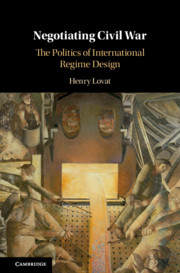(Source: CUP)
Cambridge University Press is
publishing a book on the post-WWII regime for civil wars.
ABOUT THE BOOK
Civil war has been a fact of
political life throughout recorded history. However, unlike inter-state wars,
international law has not traditionally regulated such conflicts. How then can
we explain the post-1945 emergence and evolution of international treaty rules
regulating the conduct of internal armed conflict: the 'Civil War Regime'?
Negotiating Civil War combines insights derived from Realist, Rationalist,
Liberal, and Constructivist approaches to International Relations to answer
this question, revisiting the negotiation of the 1949 Geneva Conventions, the
1977 Additional Protocols, and the 1998 Rome Statute of the International
Criminal Court. This study provides a rigorous, critical account of the making
of the Civil War Regime. Sophisticated and persuasive, it illustrates the
complex interplay of material, ideational, social, and strategic factors in
shaping these rules with important lessons for the making and unmaking of
international law in a rapidly shifting international political, economic, and
security environment.
ABOUT THE AUTHOR
Henry Lovat, University
of Glasgow
Henry Lovat is Lord Kelvin Adam Smith Research Fellow at the University of Glasgow. Formerly a legal adviser with the UK Government, he has also worked with the Council of Europe, United Nations High Commissioner for Refugees (UNHCR), United Nations Relief and Works Agency for Palestine Refugees in the Near East (UNRWA), and various UK and international NGOs, as well as in legal practice in the City of London.
TABLE OF CONTENTS
Introduction
1. Theorising the Civil War
Regime
2. Historical precursors and
regime origins
3. Negotiating Common Article 3
(1949)
4. The Additional Protocols of
1977
5. War crimes and internal armed
conflict in the Rome Statute (1998)
6. Explaining the Civil War
Regime
Conclusion.
More info here


No comments:
Post a Comment